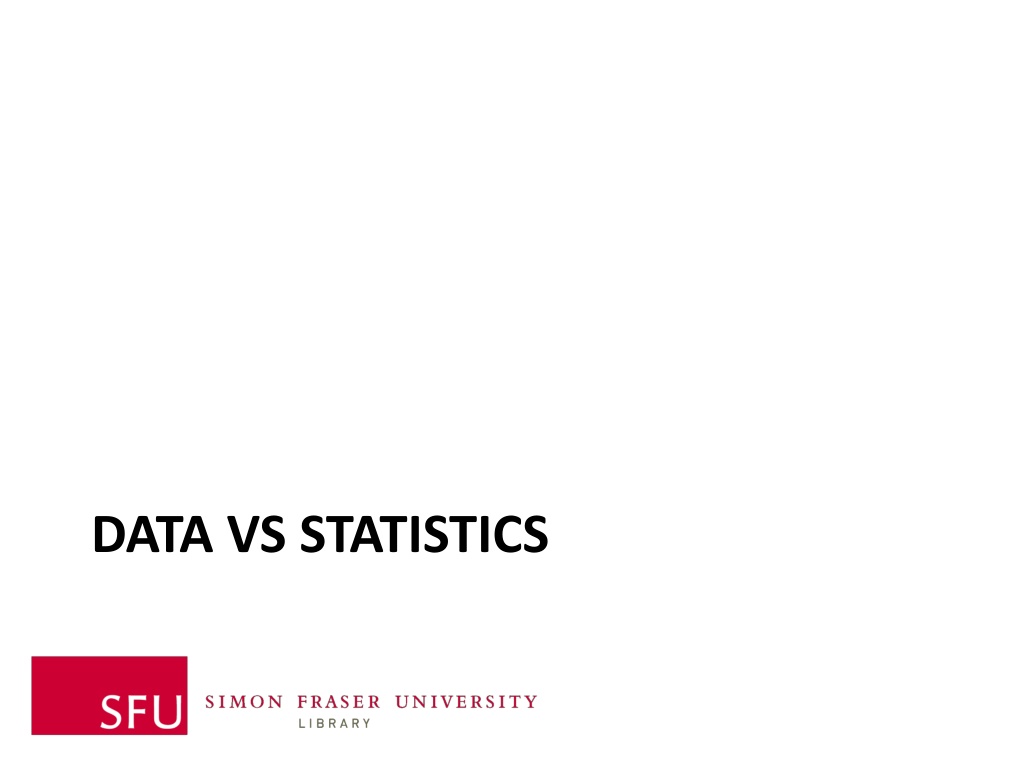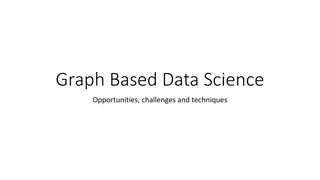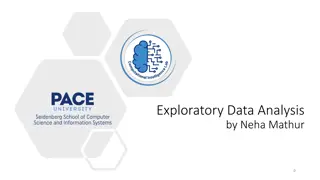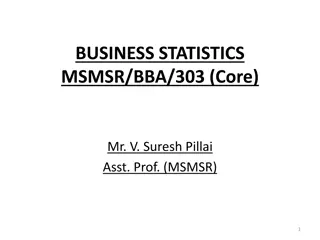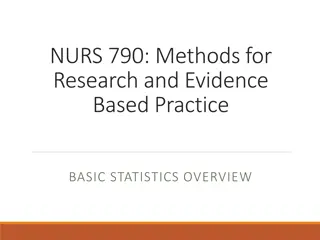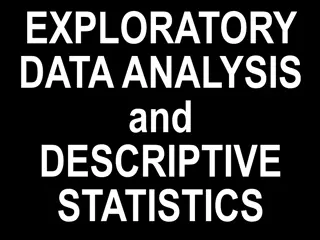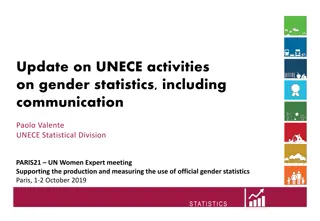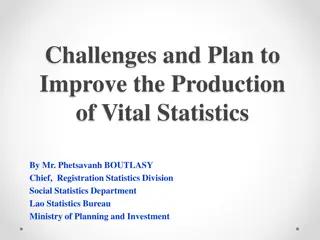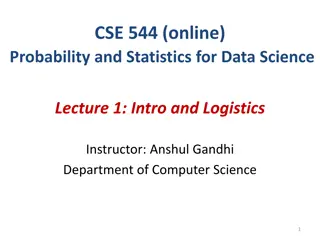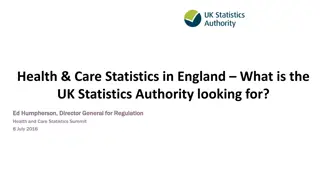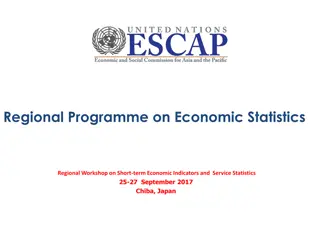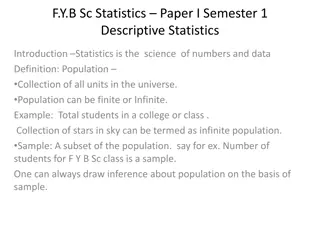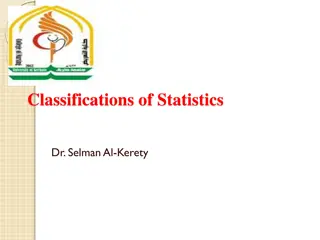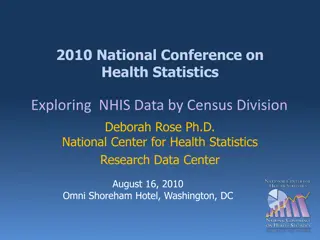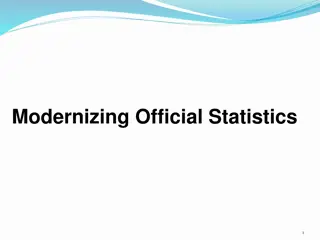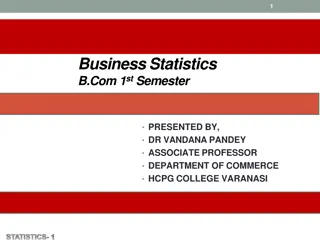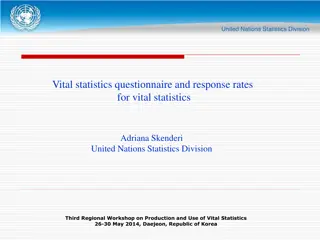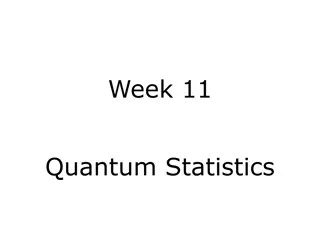Understanding Data vs. Statistics in Analysis
Data vs. Statistics: Data consists of raw facts or figures from which conclusions can be drawn, while statistics represent processed data used to support arguments. This content delves into the origins of big data, sources for data collection, and who might gather data related to specific questions. Explore the differences between raw and processed data and learn about various entities that collect data for analysis.
Download Presentation

Please find below an Image/Link to download the presentation.
The content on the website is provided AS IS for your information and personal use only. It may not be sold, licensed, or shared on other websites without obtaining consent from the author. Download presentation by click this link. If you encounter any issues during the download, it is possible that the publisher has removed the file from their server.
E N D
Presentation Transcript
Data Facts or figures* from which conclusions can be drawn Numeric files created and organized for analysis, or to create a new table require processing includes geographic data (to make maps)
Statistics Statistics are processed data, or data that have been analyzed in some way Generally used to support an argument or position in a study or report Presentation ready
Statistics or Data? Raw or cooked?
Origins of big data Census Interview everyone Census of Canada Survey Interview a sample Labour Force Survey Netting, N.S. and Burnett, M.L. (Apr 2004). Twenty Years of Student Sexual Behavior: Subcultural Adaptations to a Changing Health Environment Adolescence (39)153, 19-38. Retrieved from http://www.eric.ed.gov Administrative data Borrow data from service agencies, departments, corporations UNEP Environmental database Canadian Cancer Statistics Image credit: pennstatelive on Flickr
Who might have gathered data related to these questions? The cost of e-journals in library collections budgets The use of genomic data in the diagnosis and treatment of cancer Factors influencing Factors influencing the development of effective influenza vaccines of effective influenza vaccines the development The relationship between fish farms and the size of the salmon fishery The safest place to install a server farm
Sources by category Unofficial Official Official Non-Profit Commercial Inter Inter- - Governmental Governmental governmental governmental United United Nations Nations Municipal / Municipal / Regional Regional Think Tanks Euromonitor Federal Federal Provincial Provincial Trade / Professional Associations Metro Metro Vancouver Vancouver Statistics Statistics Canada Canada Datamonitor World Bank World Bank BC stats BC stats Other Other Ministries Ministries Other Other Fraser Health Fraser Health NGOs EIU IMF IMF Departments Departments Academic Research VGH VGH WHO WHO
Constraints Geography Time Particular Measures Outputs
Secondary sources as shortcuts Statistical yearbooks, abstracts, almanacs Organizational sites with specialized data Library and organizational metaguides Citations from research articles & books News articles
Statistical Canada Tour In Canada, providing statistics is a federal responsibility Statistics Canada legislated to serve this function for the whole of Canada and each of the provinces and territories Produces data & statistics that help Canadians better understand their country its population, resources, economy, society and culture. As well as the Census every 5 years, about 350 active surveys explore virtually all aspects of Canadian life
What can we find in Statistics Canada as support for our discussion?
Whats another word for Poverty? Higher education? Fitness? Tips: Try a broad search term and scope the results Use the Thesaurus, e.g. Poverty Use the Experts by Topic to find suggestions Browse by subject from front page Search secondary sources for leads, e.g. The Daily
Census 2011 No long form Census questionnaire Instead, use National Household Survey (2013) Methodological Document on the 2011 Census Language Data
Other collectors /producers Government of Canada: ministries, agencies Provincial Municipal Non-governmental organizations & associations Universities International statistical agencies Open data
Open Data Like many others, I believe access to government information can lead to better informed public policy debates and hopefully some improved services for citizens (such as access to transit information). ~ David Eaves Co-sponsor, Open Data Vancouver Initiative eaves.ca, May 2nd, 2012
